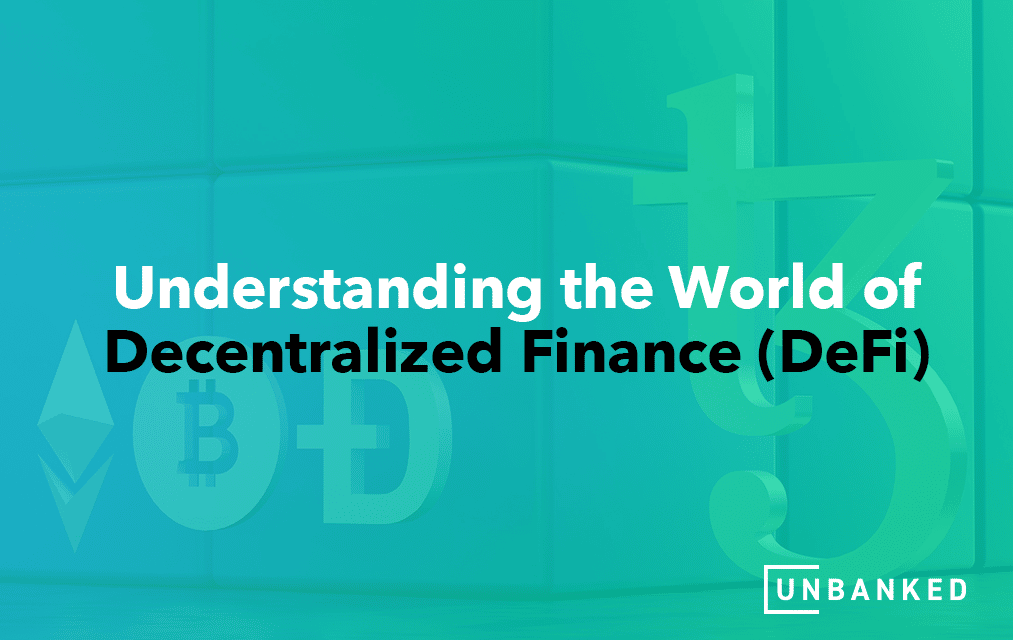Decentralized Finance (DeFi) is an open, digital monetary system that utilizes the power of blockchain to facilitate transactions. DeFi is an alternative financial system that aims to democratize finance by replacing tightly controlled, opaque legacy systems with outdated processes and infrastructure. The world of decentralized finance consists of digital assets, smart contracts, and decentralized applications (dApps). DeFi aims to give individuals control over their money, empowering anyone with access to the internet to avail of financial services and products. The idea of decentralized finance is revolutionary as the network is maintained and owned by the users themselves. This means that there are no centralized financial institutions that manage transactions. DeFi has the potential to provide financial services to the 1.7 billion Unbanked people who do not have access to financial services.
At the heart of DeFi lies its ability not to be controlled by centralized financial institutions. Intermediaries and gatekeepers primarily mediate access to centralized financial institutions. They mediate the access to loans and mortgages. Such a centralized system has not served well many marginalized communities, including racial minorities. Many cannot even cross the intermediaries or gatekeepers and receive the loan they need. On the other hand, DeFi empowers peer-to-peer exchanges while eliminating intermediaries and gatekeepers.
How Does DeFi Work?
Decentralized Finance is powered by blockchain and cryptocurrency. When someone makes a transaction through the conventional method, the transaction details are recorded in the banking history (which is a private ledger). On the other hand, a blockchain is distributed and decentralized public ledger where the financial transactions are stored. Distributed ledger means that everyone on the DeFi network gets an identical copy of the transaction records encrypted by code. This encryption gives users anonymity, asset ownership records, and payment verification. Such protection makes it resistant to fraudulent activities. Strong advocates of DeFi argue that the decentralized, distributed public ledger makes DeFi more transparent and secure than systems in centralized finance.
One of the most remarkable qualities of DeFi is its potential to democratize finance. Anyone with an internet connection can access financial services and products. Since there are no middlemen or gatekeepers, anyone can create and use decentralized finance apps.
Advantages of DeFi
As discussed above, DeFi solves many problems that have plagued the traditional financial system for decades. Some of the most significant advantages of DeFi are:
- Open to All
DeFi is an open financial system accessible and available to all irrespective of their income, race, nationality, or locality. Anyone with a computer/mobile phone and an internet connection can access the world of decentralized finance. As discussed above, there are millions of unbanked people in the world who have no access to financial products and services. They face many barriers to accessing traditional banking and financial services, including, documents like know-your-customer (KYC) and national/state ID cards. These unbanked people can take a loan without any credit score assessment or ID cards.
- Interoperability
Decentralized accounts help developers freely expand on the top of pre-existing protocols, integrate third-party apps, and customize interfaces. Due to their adaptability and flexibility, DeFi accounts are also called ‘Money Legos.’ Users can create new decentralized applications by combining other DeFi products.
- Transparency
Since DeFi enables more transparency and openness amongst the network of users. Most DeFi protocols are maintained on a blockchain (a public ledger) that allows all transactions to be available the everyone across the network. Unlike traditional banks, these transactions are not linked to anybody. All these accounts are pseudo-anoymous that are identifiable through only numerical addresses.
- Control over Finances
DeFi platforms empower users to take charge of their finances and funds. Users can store their assets on the platform and control what happens to them. There are no human intermediaries that sanction a loan or a mortgage rather everything is done through smart contract agreements. This means that there is no discrimination – nobody can prohibit anyone from accessing a DeFi protocol.
- Innovation
The decentralized finance environment offers possibilities to create and innovate new DeFi products and services. DeFi is an open-source protocol that allows and enables the development of innovative financial solutions. It uses Ethereum which allows developers to create financial applications for a digital-forward era.
The Future of DeFi
DeFi is still in the early stages of a revolution. There are several unanswered and undealt questions that must be addressed to make DeFi more mainstream. Being largely unregulated, the DeFi system is susceptible to structural flaws, scams, and drawbacks. With DeFi’s borderless and transnational transferring capabilities, it becomes difficult to hold someone accountable for any financial crimes. Other concerns related to DeFi include energy requirements, stability, carbon footprint, system maintenance, system upgrades, and hardware failures. These questions must be addressed to make DeFi safe to use for everyone.
These challenges do not mean that innovation is not happening in this domain. The first generation of DeFi apps is using cryptocurrency as collateral to sanction loans. For instance, a user has to put their crypto as collateral to get a loan. The insurance industry is undergoing massive innovation due to the latest version of DeFi apps. Most of the loans are highly collateralized, which makes them inherently safe. Along with DeFi apps, there is also a move towards decentralized governance and decentralized decision-making mechanisms. The DeFi community is exploring ways to allow all stakeholders to vote on crucial decisions, making the introduction of new DeFi products more democratic.
With Unbanked Yield, you can connect with DeFi yields and earn exciting opportunities not offered by the traditional banks. At Unbanked Yield, we aim to provide you with financial freedom and control over your funds and help you earn the best yield rate possible. We go a step further than other platforms to bridge the gap between DeFi and you by giving extra benefits to our NFT holders. The NFT holders can get 20% more rewards on the yield activated. Check out our website if you are interested in learning more!





